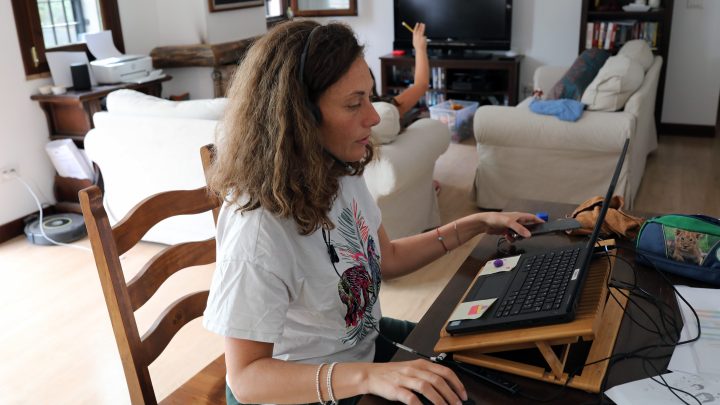
The Consumer Reports CEO on fighting for protections in our online world
The Consumer Reports CEO on fighting for protections in our online world

We’re spending more time online these days, relying on the internet to work, learn and connect with each other. But the hard-won regulations that protect consumers in the analog world haven’t always caught up with the rapidly changing digital marketplace.
The issue has been thrown into stark relief during the COVID-19 pandemic as scams, opportunism and misinformation has flourished in our online communities.
Consumer Reports has been tracking how consumers are faring during the pandemic. Survey results show that many Americans are delaying planned purchases or abandoning those plans altogether.
“I think the headline is frailty, economic and social frailty,” Marta Tellado, the president and CEO of Consumer Reports, told “Marketplace Morning Report” host David Brancaccio. The following is an edited transcript of their conversation.
David Brancaccio: Now people may not understand this about Consumer Reports — you cover important issues and test products, but you’re also looking at public policy, especially during this time of COVID-19. I mean, there are a lot of things that are going to change, and policy changes have winners and losers.
Marta Tellado: We have winners and losers, and I think one of the things that is stark in COVID-19 is that here we are transitioning to an online world and an online marketplace, and many of the consumer protections and the hard-fought battles that we did in the analog world don’t apply to this new world that we’re living in now.
So think about it: We have 50 million schoolchildren now that are supposed to be learning online, but we know that one-third of Americans don’t even have a reliable fast broadband connection. And in our survey, we found that 80% feel and agree that the internet has got to be as important as electricity and water. And that’s up from 61% just three years ago.
So, you know, we’re experiencing it now because we’re at home, working from home, searching for jobs at home, relying on telemedicine. We can’t live our lives in this moment without an affordable connection to the internet. And that’s one of the ways in which I think we need to see some real change.
Brancaccio: And you’ve been trying to hold social media’s feet to the fire here in terms of accuracy of ads?
Tellado: We did an experiment with Facebook, and we recently drew up a number of false and misleading ads about the coronavirus, including one that made a case for drinking bleach, and we submitted it to Facebook. They reviewed it. All seven of the ads they approved. Now, of course, we never posted those ads, but it really makes you wonder — how much more harmful misinformation in this environment of uncertainty is showing up?
Brancaccio: I’m careful not to see this nightmare we’re going through as an opportunity. However, there could be social improvements that grow out of this. Do you see some possibilities of ultimately us getting to a better place if we get through this?
Tellado: I do. And in the end, my hope of what comes out of this is a more trustworthy marketplace. One where we can rely on accountable institutions and credible information, which is what I think the public is hungry for and one that’s responsive to them and it’s responsive to them by default. I think that’s what flattens the curve in a pandemic.
Brancaccio: Now, you’ve been reaching out to people, to consumers, to find out how we are faring. It’s a lot of fascinating data here, but something that stood out is just how many people have delayed some big expenditures or even canceled some big stuff they had been planning.
Tellado: COVID-19 has had a tremendous impact. And I think the headline is frailty, economic and social frailty. And when one-third of U.S. adults have lost their wages or their income due to the pandemic, what we’re seeing is that, when asked, that means they’re putting a pause button on their planned expenses, making tough decisions.
Brancaccio: Yeah, but it’s quite stark to actually see the data though. Fifty-seven percent have delayed a large home improvement project, 18% have cancelled it outright? I mean, elective medical procedures — yes, many people are delaying, 70% for obvious reasons, but 19% have thrown in the towel. They’re just not going to get an elective medical procedure. That’s quite a decision.
Tellado: Well, I think what it underscores is a tremendous amount of uncertainty. And so they are just hitting pause and they don’t know which way this is going to go.
There’s a lot happening in the world. Through it all, Marketplace is here for you.
You rely on Marketplace to break down the world’s events and tell you how it affects you in a fact-based, approachable way. We rely on your financial support to keep making that possible.
Your donation today powers the independent journalism that you rely on. For just $5/month, you can help sustain Marketplace so we can keep reporting on the things that matter to you.












